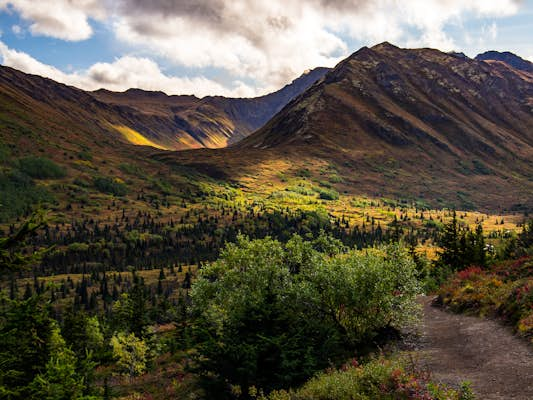National parks like Bryce Canyon and the Smoky’s are stunning, but there’s something a little personal about a state park.
Whether its right in your backyard or you have to drive hours just to get to it, state parks are like that beloved hometown sports team that you’ll always root for.
Here are our favorite 50 state parks in the USA.
 Gulf Shores State Park, Alabama © Cavan Images / Getty
Gulf Shores State Park, Alabama © Cavan Images / Getty
Alabama – Gulf Shores State Park
With its warm, light-blue waters, white sand beaches and endless horizons stretching over the Gulf of Mexico, the town of Gulf Shores represents a particular kind of oceanside fantasy. There are two miles of beach here, as well as a nature center (9am to 4pm Monday to Friday), a dog park and roughly 25 miles of hiking and cycling trails – keep an eye peeled for gators.
Alaska – Chugach State Park
This stunning 495,000-acre park is one of the four largest state parks in the US. Located in southcentral Alaska, this state park has a rugged shoreline, big lakes, ice fields and massive glaciers. On the western side of the park is the Chugach Mountain Range (seven miles from Anchorage) and on the southern part of the park is the Turnagain Arm.
Introducing Alaska’s national parks
Scout new ways to explore the planet’s wildest places with our weekly newsletter delivered to your inbox.
Arizona – Kartchner Caverns State Park
This drippy subterranean castle was 330 million years in the making, yet it remained Arizona’s best-kept secret until it opened as a park in 1999. On 90-minute educational tours through this underground Gothic fantasyland, you might hear the squeak of migrating bats in the Big Room cave (October–April) or feel like a royal troll in the column-lined Throne Room. Reservations are recommended. It’s also a designated International Dark Sky Park.
Arkansas – Crater of Diamonds State Park
An average of 600 diamonds are found each year at one of the only places in the world where visitors can search for real diamonds and keep what they find. This park in Murfreesboro, Arkansas, boasts several notable finds including the over 40-carat Uncle Sam, the largest diamond ever uncovered in the US.
Explore Arizona’s natural beauty beyond the Grand Canyon on this epic road trip
 A giant redwood in the Prairie Creek Redwoods State Park © Matt Munro / Lonely Planet
A giant redwood in the Prairie Creek Redwoods State Park © Matt Munro / Lonely Planet
California – Prairie Creek Redwoods State Park
Famous for some of the world’s best virgin redwood groves and unspoiled coastline, this 14,000-acre section of Redwood National & State Parks has spectacular scenic drives and 75 miles of mainly shady hiking trails, many of which are excellent for children. Kids of all ages will enjoy the magnificent herd of elk here, which can generally be spied grazing at the Elk Prairie, signposted from the highway; the best times to be sure of seeing the elk are early morning and around sunset.
Colorado – Pearl Lake State Park
A glorious spot for camping and canoeing, this small alpine lake, located in the mountains north of Steamboat Springs, backs up to aspen and evergreen forests, and has some excellent lake-front campsites ($20). Try to get a lower campsite bordering the lake; numbers 24 to 32 are best. They have two yurts ($90) here too, plus a short trail to Coulton Creek.
Introducing Colorado’s National Parks
 Kent Falls State Park, Connecticut © Posnov / Getty Images
Kent Falls State Park, Connecticut © Posnov / Getty Images
Connecticut – Kent Falls State Park
Given Connecticut’s size, it makes sense that the state doesn’t have parks on the scale of, say, Yellowstone. Its small ones, however, have their charm. Kent Falls, with its cascades tumbling into the Housatonic River, is in the pretty Litchfield Hills of northwestern Connecticut. Part of the southern Berkshires, it’s a prime area to enjoy New England fall foliage.
Delaware – Delaware Seashore State Park
South of Rehoboth Beach, this state park is a barrier island stretching for six miles with Rehoboth Bay on one side and the Atlantic on the other. The bay’s calm waters are ideal for windsurfing, while six trails can be explored on foot, by bike or on horseback. The park’s Big Chill Beach Club serves casual fare and cocktails.
10 of the most spectacular waterfalls at Yellowstone National Park and how to see them
 Enjoy a little solitude at Cayo Costa © Thinkstock Images / Getty Images
Enjoy a little solitude at Cayo Costa © Thinkstock Images / Getty Images
Florida – Cayo Costa State Park
Accessible only by boat, Southwest Florida’s Cayo Costa Island is almost entirely preserved as a 2500-acre state park. While its pale, ash-colored sand may not be as fine as that of other beaches, its idyllic solitude and bathtub-warm waters are without peer. Bring a snorkel and mask to help scour sandbars for shells and conchs.
Georgia – Providence Canyon State Park
Painted a rainbow of oranges, pinks, reds and whites by the exposed rock, 16 gorges comprise the “Little Grand Canyon,” as it’s called. Created thanks to erosion-causing farming techniques in the 19th century, today it’s one of Georgia’s natural wonders. The 1003-acre park is located in Stewart County in Lumpkin, Georgia.
Aquatic thrills in coastal Florida
 Enjoying the beautiful view of Waimea Canyon at Kauai Island, Hawaii © noblige / Getty
Enjoying the beautiful view of Waimea Canyon at Kauai Island, Hawaii © noblige / Getty
Hawaii – Waimea Canyon State Park
Waimea Canyon is a gargantuan chasm of ochre and blood-red lava rock is quite simply one of the world’s natural wonders. At 10 miles long and over 3000ft deep, this gouge in the land is so spectacular it has been popularly nicknamed the “Grand Canyon of the Pacific.” Flowing through the canyon is Waimea River, Kauaʻi’s longest river and a great spot for adventures on the water.
Idaho – Bruneau Dunes State Park
Climb and dune-sled in Bruneau at this 470ft phenomenon, the tallest single-standing sandhill in North America. Camp or stay in a cabin overnight and take advantage of the observatory’s telescope collection and the pristine night sky.
Hawai‘i Volcanoes National Park is still a hot destination
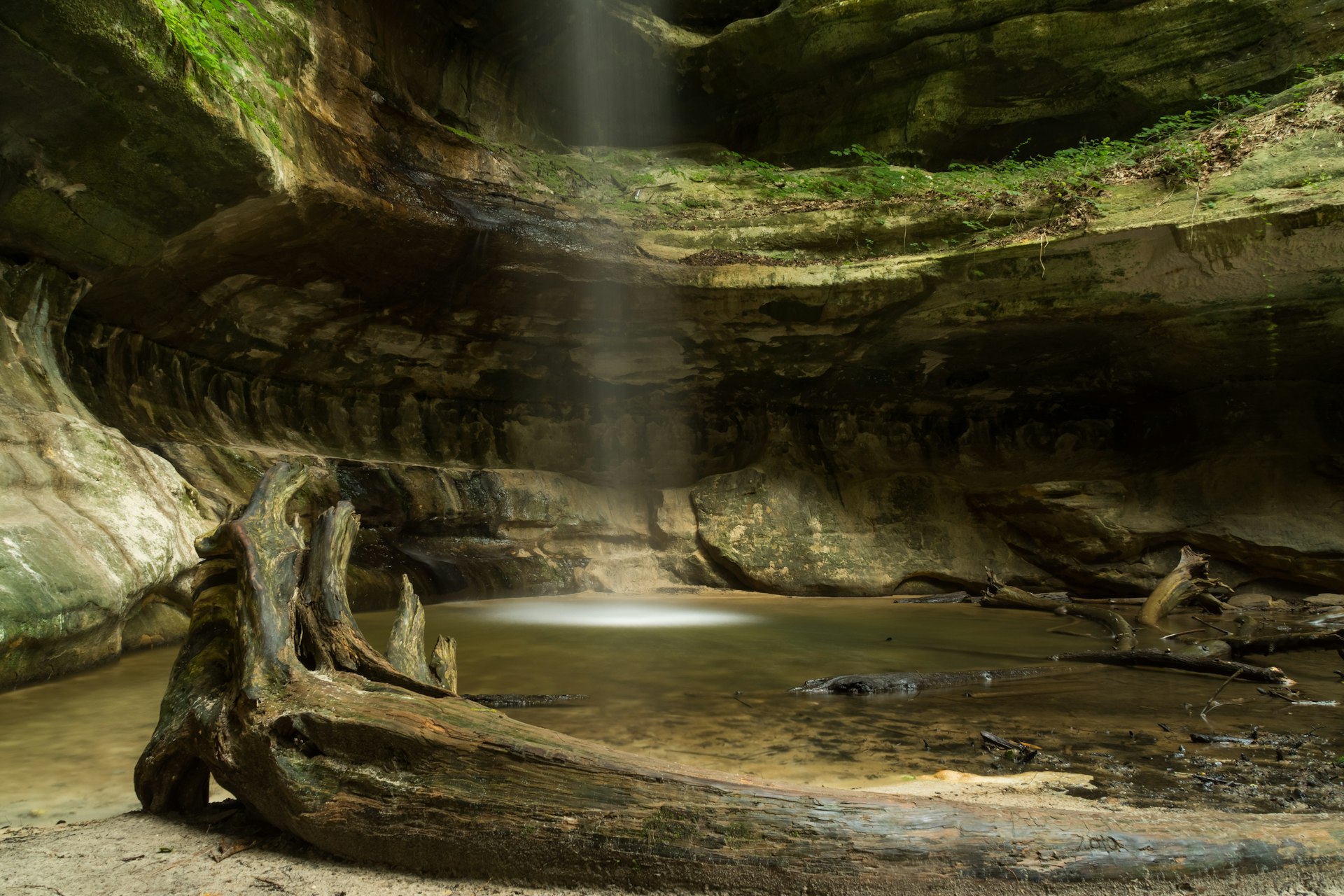 Starved Rock State Park is filled with more than 13 miles of trails and 133 campsites © Getty Images / EyeEm
Starved Rock State Park is filled with more than 13 miles of trails and 133 campsites © Getty Images / EyeEm
Illinois – Starved Rock State Park
One of the state’s most popular natural retreats is famous for its canyons, bluffs and waterfalls, which you can explore via 13 miles of trails and 133 campsites dotted throughout this 2630-acre preserve on the Illinois River. Get out and roam the surrounding historic communities of LaSalle and Ottawa, or book a room at the 1930s-era Starved Rock Lodge in Oglesby and have dinner under the stars on the lodge’s back patio.
Indiana – Indiana Dunes State Park
The state park is a 2100-acre, shoreside pocket within the Indiana Dunes National Park it’s located at the end of Hwy 49, near Chesterton. It has more amenities than the rest of the lakeshore, but also more regulation and crowds (plus the vehicle entry fee). Wintertime brings out the cross-country skiers; summertime brings out the hikers. Seven trails zigzag over the landscape; No. 8 goes up Mt Tom and rewards with Chicago skyline views.
Iowa – Backbone State Park
Iowa’s oldest state park is also one of its most beautiful, with plenty of outdoor recreation opportunities including camping, canoeing, beach volleyball, rock climbing and trout fishing. The heavily wooded area of rocky terrain and forested bluffs in Dundee is most well known for its steep ridge, nicknamed the Devil’s Backbone, and a popular hike along the Backbone Trail.
Kansas – Cedar Bluff State Park and Reservoir
Located along the shorelines of the Cedar Bluff Reservoir, the 1000-acre area is outfitted with boat ramp facilities, campgrounds, BMX track and designated areas for swimming and fishing.
This US national park is full of hot springs – and it’s turning 100 years old
 Ever see a moonbow? © ehrlif / Getty Images
Ever see a moonbow? © ehrlif / Getty Images
Kentucky – Cumberland Falls State Resort Park
Cumberland Falls is one of the few places in the world to see a moonbow, a rainbow that forms in the water’s mist at night. The park website has dates for when the phenomenon occurs each month. A one-mile round-trip trail takes you to the falls, a 125ft-wide curtain of water that’s pretty dramatic anytime.
Louisiana – Chicot State Park
A wonderful place to access the natural beauty of Cajun country. The excellent arboretum is fun for kids and informative for adults, and deserves enormous accolades for its open, airy design. Miles of trails extend into the nearby forests, cypress swamps and wetlands. If you can, stay for early evening – the sunsets over the Spanish-moss-draped trees that fringe Lake Chicot are superb.
The complete guide to Mammoth Cave National Park
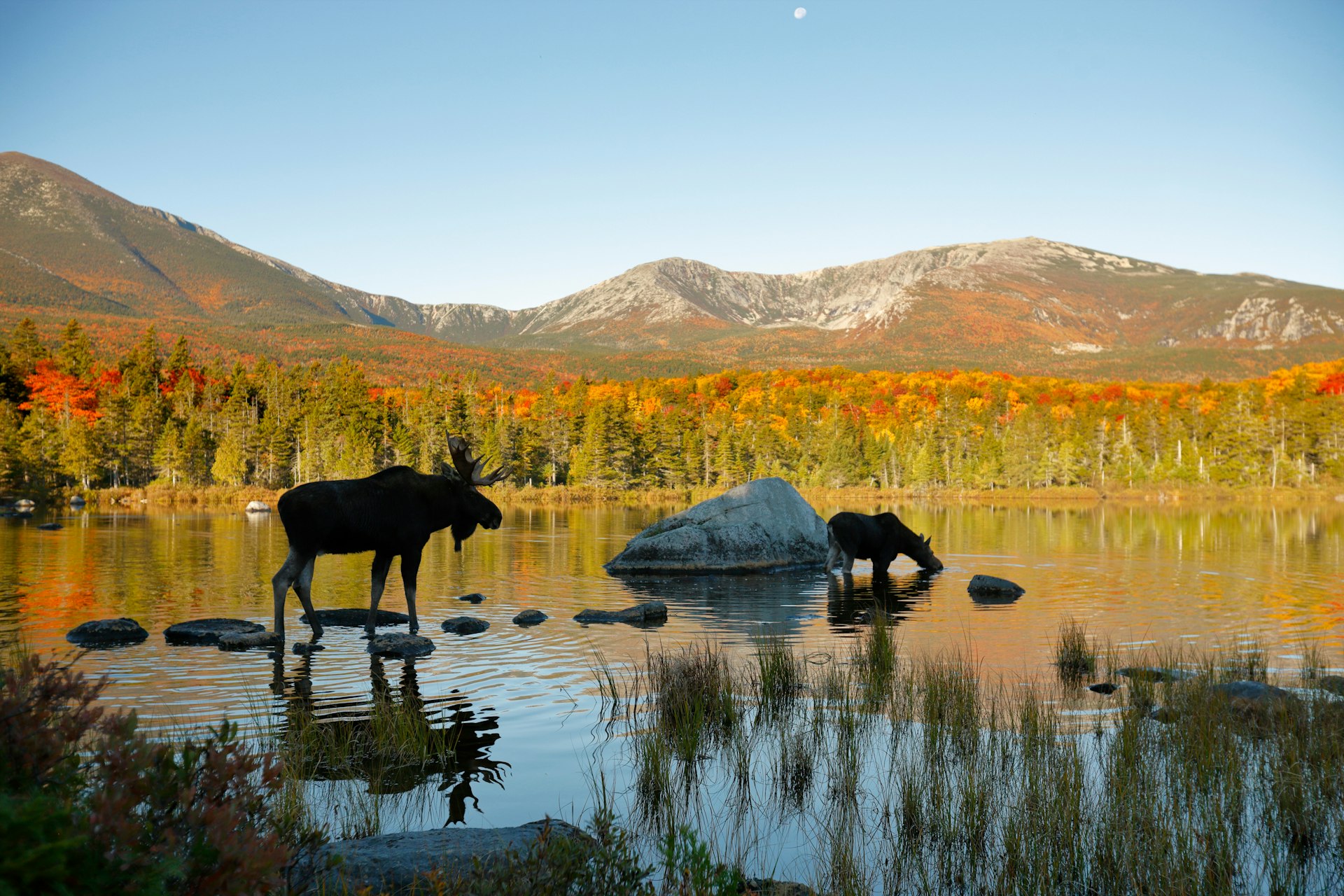 Two moose keep cool in Baxter State Park © Paul Tessier / Shutterstock
Two moose keep cool in Baxter State Park © Paul Tessier / Shutterstock
Maine – Baxter State Park
Set in the remote forests of northern Maine, Baxter centers on Mt Katahdin (5267ft), Maine’s tallest mountain and the northern terminus of the 2190-mile Appalachian Trail. This vast 209,000-acre park is maintained in a wilderness state: no paved roads, no electricity and no running water (bring your own or plan on purifying stream water). There’s a good chance you’ll see moose, deer and black bears.
Maryland – Patapsco Valley State Park
The Patapsco River Valley is the defining geographic feature of the region, running through central Maryland to the Chesapeake Bay. Gorgeous Patapsco Valley State Park – one of the oldest in the state – runs for 32 miles near Ellicott City and encompasses a whopping 170 miles of trails, especially prized by mountain bikers.
Massachusetts – Skinner State Park
This mountaintop park, at the summit of Mt Holyoke, peaks out at a rather modest-sounding height of 942ft. But that’s high enough to earn the visitor panoramic views of the Connecticut River and its oxbow curve, the fertile valley and the distant smudge of Mt Greylock to the west. A 1.5-mile road to the top is open to hikers year-round and to vehicles from May to October. The park is north of South Hadley off MA 47 in Hadley.
Acadia National Park is introducing a timed reservation system for visitors
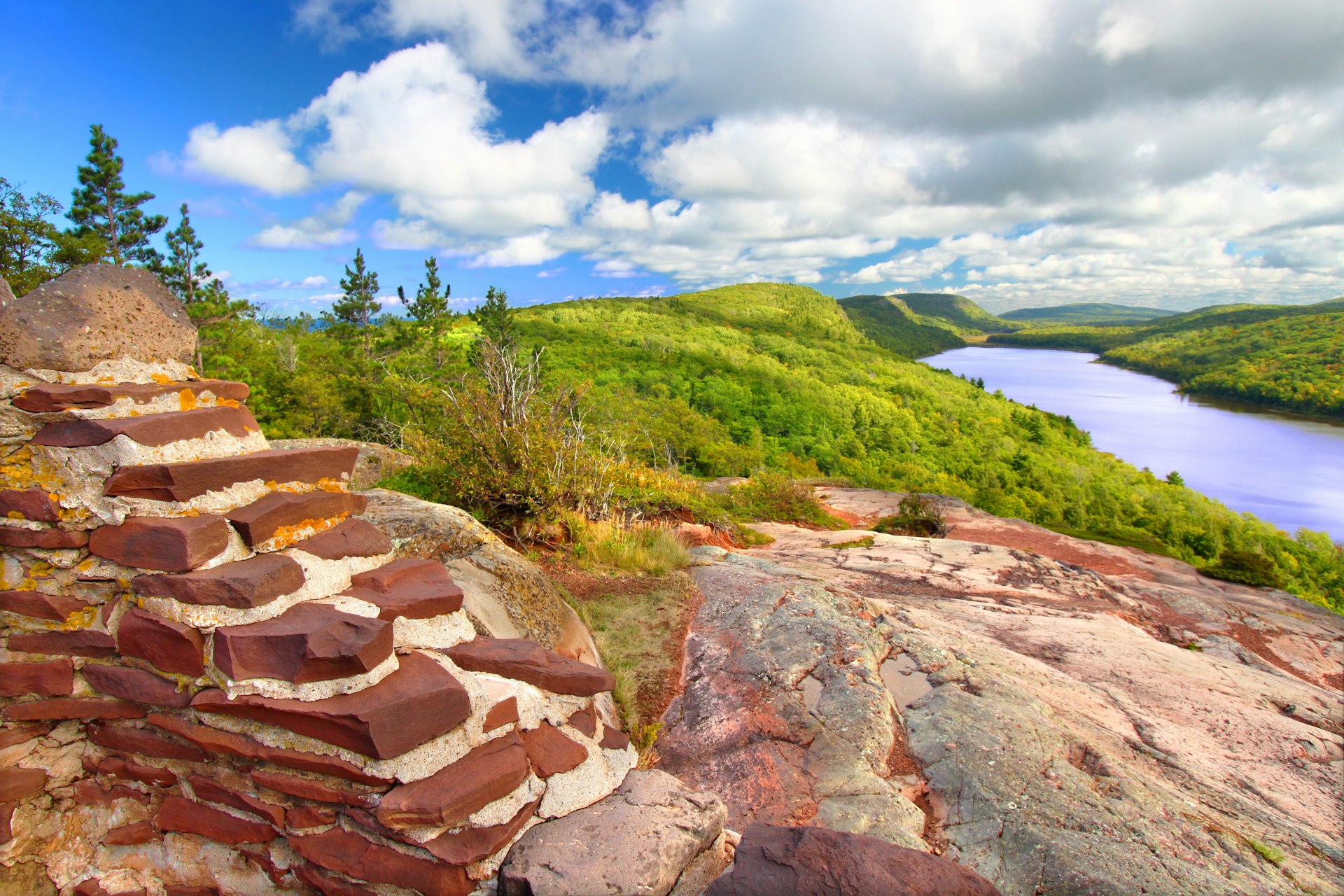 Porcupine Mountains State Park in northern Michigan offer spectacular views © Getty Images / iStockphoto
Porcupine Mountains State Park in northern Michigan offer spectacular views © Getty Images / iStockphoto
Michigan – Porcupine Mountains Wilderness State Park
Michigan’s seemingly endless bounty of natural beauty continues in this off-the-beaten-path wilderness in Michigan’s Upper Peninsula, where small mountains sprawled out across vast virgin wilderness reveal spectacular fall foliage and myriad small inland lakes, including the popular Lake of the Clouds. Caution: bears are common in “the Porkies.”
Minnesota – Itasca State Park
In local highlight Itasca State Park, you can walk across the tiny headwaters of the Mississippi itself before it sets out on its 2522-mile journey to the Gulf of Mexico, which is pretty wild. Wade in the knee-deep flow and hop over a couple of stepping stones, then boast you strode over the Father of Waters.
Experience the Great Lakes on one epic road trip
 Tishomingo State Park in the foothills of the Appalachian Mountains © traveler jordan / Shutterstock
Tishomingo State Park in the foothills of the Appalachian Mountains © traveler jordan / Shutterstock
Mississippi – Tishomingo State Park
Named for a Chickasaw chief, this park in Tishomingo offers camping among the evocative, moss-covered sandstone cliffs and rock formations, fern gullies and waterfalls of Bear Creek Canyon. It’s a special oasis, once utilized by the Chickasaw and their Paleo-Indian ancestors.
Missouri – Elephant Rocks State Park
With a little imagination (read: squinting), the hefty pink granite boulders that steal the show in this state park look like a train of circus elephants. Located in southeastern Missouri near Belleview, the park is a geologist’s dream, formed from 1.5-billion-year-old granite. The mile-long, accessible Braille Trail Loop is a great introduction to the terrain, and kids love clambering up and over the rocks.
Museums and more in Missouri: art, history and culture in St Louis and beyond
 At one time, Bannack was a town of over 3000 people © Lucentius / Getty Images
At one time, Bannack was a town of over 3000 people © Lucentius / Getty Images
Montana – Bannack State Park
Montana is dotted with ghost towns – mining settlements that arose from nothing and whose populations plummeted as soon as nearby deposits were exhausted. Bannack in southwestern Montana is one of the earliest of them and among the best preserved. Once a town of 3000, it was established in 1862 and even served as the territorial capital for a period.
Nebraska – Fort Robinson State Park
This old military fort’s turbulent past belies its stately appearance today: Crazy Horse was killed here in 1877, “buffalo soldier” African American brigades were formed here and it was a POW camp for Germans. The greater park offers 22,000 acres of panoramic Pine Ridge scenery. Campgrounds are open year-round and there’s a seasonal lodge in the old brick barracks. Restored buildings have displays.
50 fun facts about US states to impress your friends
 Nevada’s Cathedral Gorge State Park © Carol Polich / Lonely Planet
Nevada’s Cathedral Gorge State Park © Carol Polich / Lonely Planet
Nevada – Cathedral Gorge State Park
Sidling up to the Utah border in eastern Nevada near Panaca, this park enchants with its spectacular cathedral-like spires, starkly eroded bentonite clay cliffs and slot canyons in buff pinks and rust reds. The result of volcanic activity millions of years ago, the formations are best explored on the 4-mile ridge trail.
New Hampshire – Franconia Notch State Park
For centuries this park in the White Mountains was the home of the Old Man in the Mountain, a series of cliffs that formed what looked like the profile of a man. The iconic landmark collapsed in 2003 due to natural fissures, but visitors still come to explore a magnificent mountain pass that includes the stunning Flume Gorge and an aerial tramway.
New Jersey – Benjamin T Byrne State Forest
Over 37,000 acres of peaceful state forest beckon in the New Jersey Pine Barrens between Philadelphia and the Jersey Shore. The trails here pass through the hardwood and Atlantic white cedar swamps, pitch pine lowlands and upland pine and oak forests, which visitors have almost to themselves.
What it’s like to hike among 5000-year-old trees
 Navajo Lake State Park is a hotspot for boating © Shutterstock / Brenda Landdeck
Navajo Lake State Park is a hotspot for boating © Shutterstock / Brenda Landdeck
New Mexico – Navajo Lake State Park
Home to the second largest lake in New Mexico, this state park is a hot spot for boating and lake-view camping. There are more than four miles of trails and it’s a good launchpad for fly fishing on the nearby San Juan River. Stop by the park visitor center for a few exhibits and suggestions for activities.
New York – Bear Mountain State Park
The main draw here are the views of the Manhattan skyline from the 1303ft peak (accessible by car), but there’s also ice skating in winter and boating and swimming in summer. There are several scenic roads snaking their way past secluded lakes with gorgeous vistas.
North Carolina – Mount Mitchell State Park
A major decision awaits visitors to North Carolina’s original state park. Will you drive up Mount Mitchell, the highest peak east of the Mississippi at 6684ft, or will you hike to the top? Make your mind up at the park office, which sits beside a steep 2.2-mile summit trail that typically takes around 1½ hours, one way.
First-timer’s guide to Great Smoky Mountains National Park
 Fort Abraham State Park © Randy Runtsch / Shutterstock
Fort Abraham State Park © Randy Runtsch / Shutterstock
North Dakota – Fort Abraham Lincoln State Park
The highlight at this attractive rural park on the west bank of the Missouri is On-a-Slant Indian Village, which has five re-created Mandan earth lodges. The fort, with several replica buildings, was Custer’s last stop before the Battle of Little Bighorn. It’s seven miles south of Mandan (or about 13 miles from downtown Bismarck). It has extensive hiking trails and summertime tours.
Ohio – Hocking Hills State Park
Hidden in Hocking County, Hocking Hills State Park is splendid to explore in any season (but especially lovely in autumn), with miles of trails for hiking and biking past waterfalls and gorges. It features several spectacular rock formations, whose gorges and recesses tempt explorers. Old Man’s Cave is a scenic winner for hiking.
Where to find the USA’s 12 newest national parks
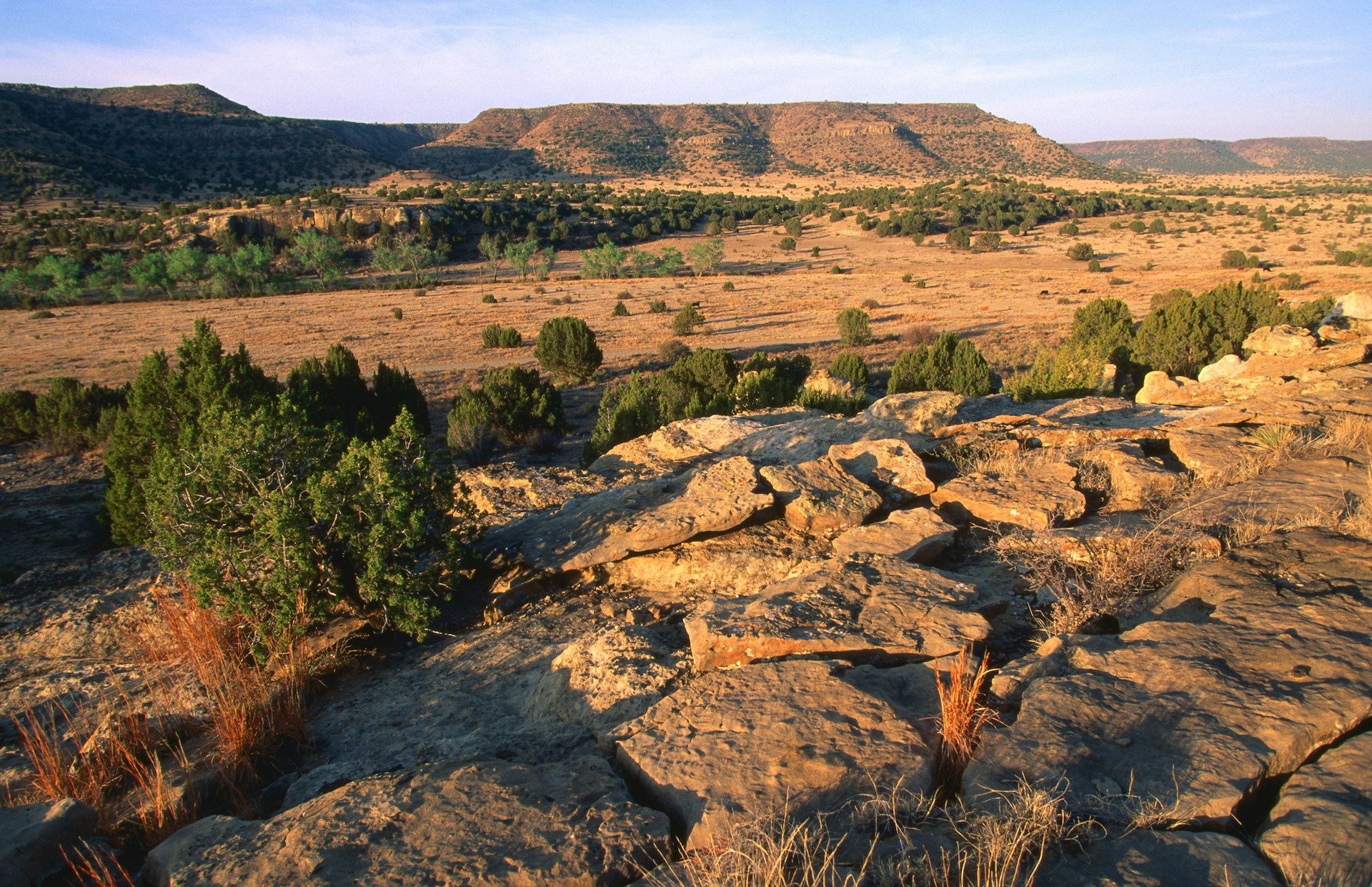 Black Mesa State Park offers a chance to stand in three states at the same time © John Elk / Getty Images
Black Mesa State Park offers a chance to stand in three states at the same time © John Elk / Getty Images
Oklahoma – Black Mesa State Park
Named after the thick coating of black lava rock that covered the area 30 million years ago, this beautiful park in Kenton is ideal for camping, wildlife watching and hiking. Don’t miss the Three Corners marker, where you can stand in Oklahoma, Colorado and New Mexico all at once.
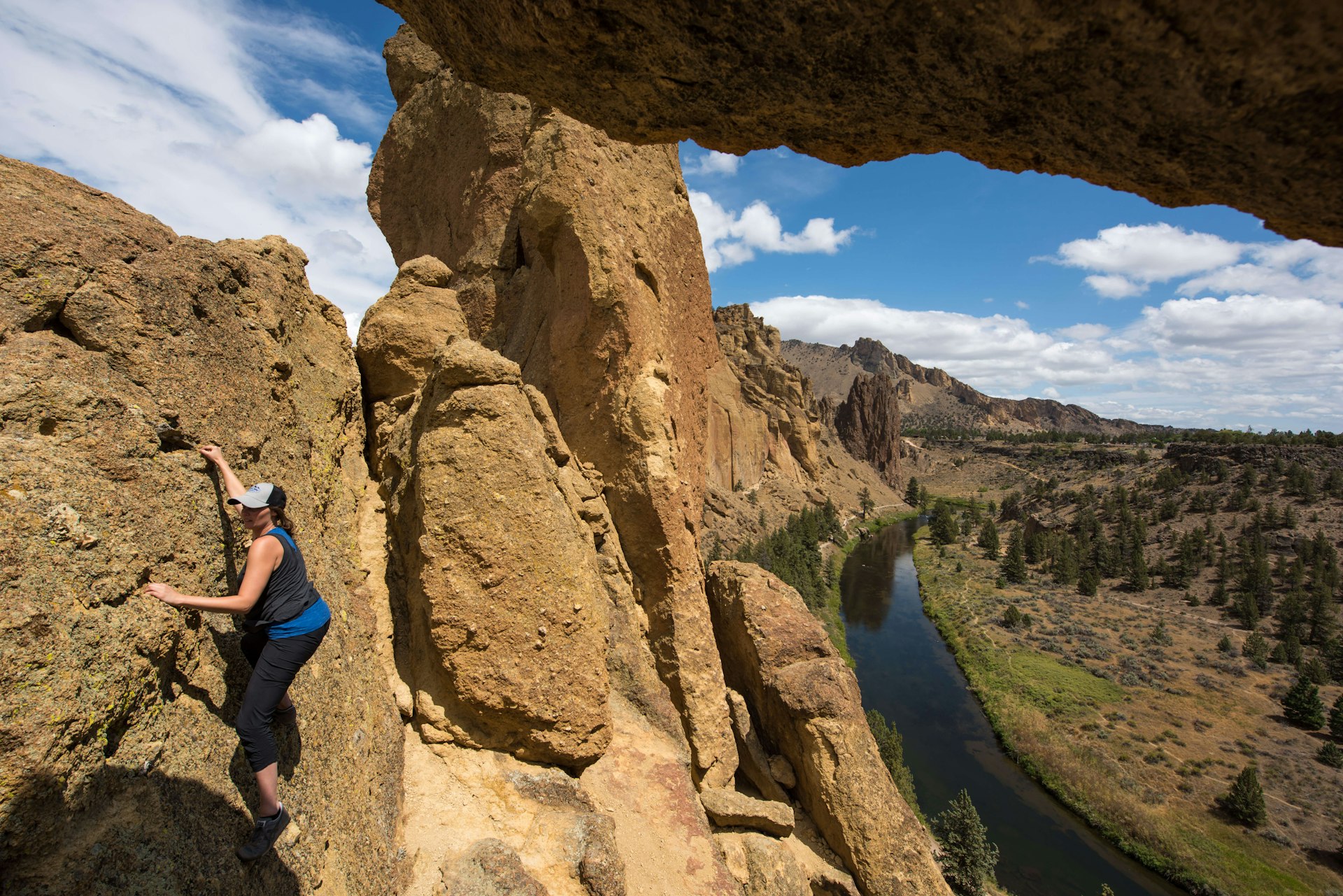 Climbing Smith Rock State Park in Bend, Oregon © OverlandTheAmericas / Shutterstock
Climbing Smith Rock State Park in Bend, Oregon © OverlandTheAmericas / Shutterstock
Oregon – Smith Rock State Park
No discussion of American sport climbing omits mention of this glorious state park perched atop the rust-red high desert of central Oregon. The region’s walls, gullies, gorges and spires are renowned for advanced climbing opportunities; however, the 1800 marked routes include some easier ascents, and there are hiking trails for those who arrive without chalk and harnesses.
Pennsylvania – Cherry Springs State Park
If you think that you need to travel to the West to see the night sky in all its glory, you may be surprised to learn that Pennsylvania has an International Dark Sky Park in the northern part of the state. At Cherry Springs, far from any urban centers, the stars shine brightly, to amateur astronomers’ delight.
Rhode Island – Colt State Park
Bristol’s Colt State Park is Rhode Island’s most scenic park, with its entire western border fronting Narragansett Bay. The park is fringed by four miles of cycling trails and has more than 400 shaded picnic tables set among 464 acres of groomed fruit trees, flower beds and lush greenery.
The top 10 most visited national parks in the US
 Hunting Island Lighthouse is an iconic feature at this South Carolina state park © Daniela Duncan / Getty Images
Hunting Island Lighthouse is an iconic feature at this South Carolina state park © Daniela Duncan / Getty Images
South Carolina – Hunting Island State Park
Camp amidst the tangled maritime forest of this 5000-acre undeveloped barrier island. The beach is as pristine as they come with comfortably warm waters by midsummer. Paddle through the silent, humid marshes, bike the lagoonside trail or climb the long-defunct 1875 lighthouse. So lush and dense is the foliage, the Vietnam War scenes from Forrest Gump were filmed here. No wonder it’s the most visited state park in the state.
 You’re likely to spot American bison in Custer State Park, South Dakota © Cavan Images RF / Getty Images
You’re likely to spot American bison in Custer State Park, South Dakota © Cavan Images RF / Getty Images
South Dakota – Custer State Park
Custer State Park boasts some of the best American wildlife viewing outside of Yellowstone, as well as curvaceous mountain drives, serene lakeside retreats and plenty of open range.
Tennessee – Fall Creek Falls Creek State Park
Waterfalls crash high and low inside this rugged 26,000-acre park that hugs the craggy surface of the Cumberland Plateau 115 miles southeast of Nashville. The most eye-catching is the park’s namesake, the veil-like Fall Creek Falls. Dropping 256ft, it’s one of the tallest waterfalls in the east. A 0.4-mile trail drops to its base.
Texas – Seminole Canyon State Park & Historic Site
The best art galleries in south-central Texas are right here along the Rio Grande, and their works have been on view for at least 4000 years. This state park (nine miles west of Comstock), is famous for Fate Bell Shelter, a natural canvas of ancient rock art. If the art here were merely decorative, it would be magnificent, but the pictographs are more than just images – they’re windows into their creators’ daily routines, dreams, hopes and fears.
15 unforgettable experiences in US national parks
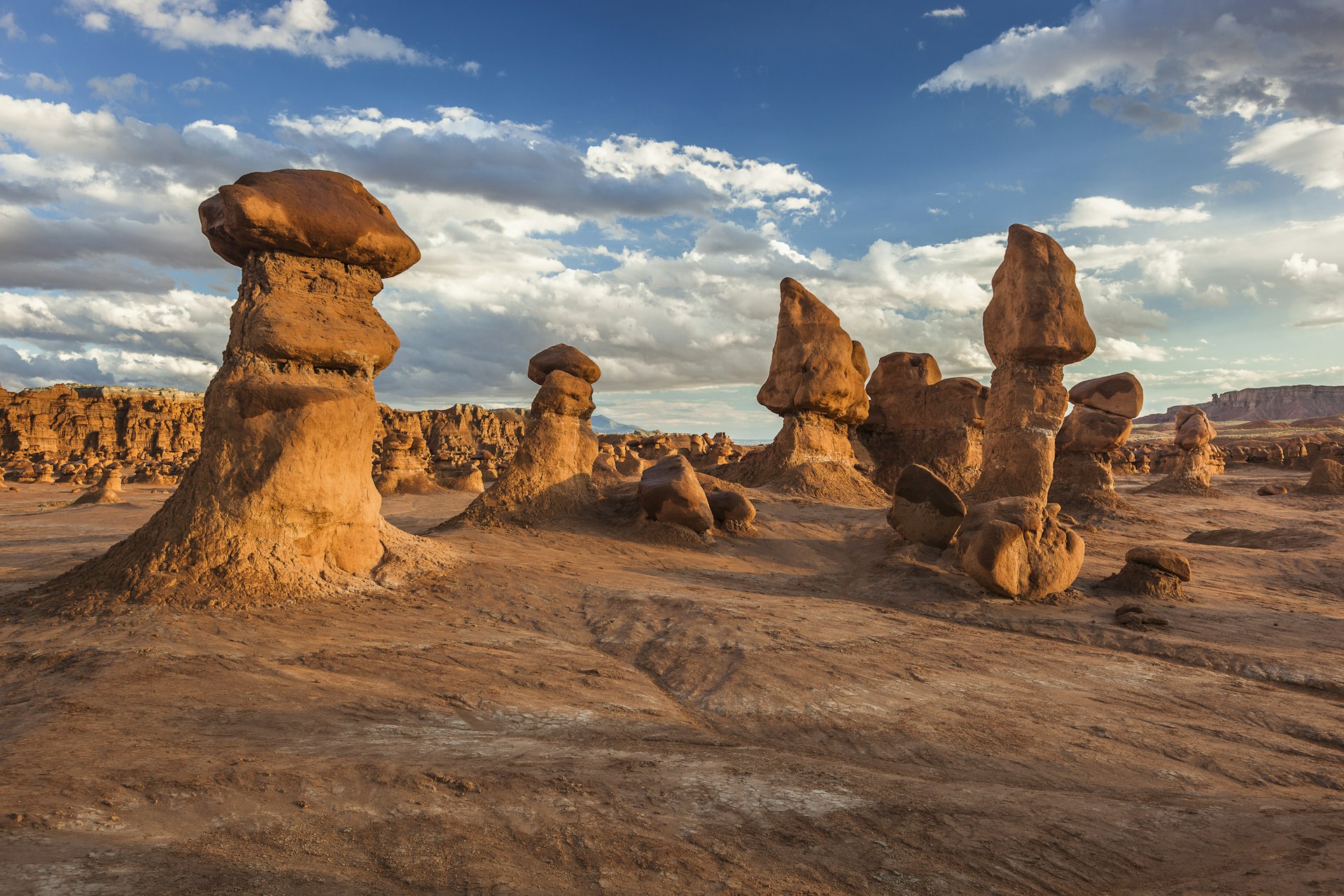 Spend a day looking at some truly unique rock formations at Goblin Valley State Park © Whit Richardson / Getty Images
Spend a day looking at some truly unique rock formations at Goblin Valley State Park © Whit Richardson / Getty Images
Utah – Goblin Valley State Park
A Salvador Dalí–esque melted-rock fantasy, a valley of giant stone mushrooms, an alien landscape or the results of a cosmological acid trip? No matter what you think the stadium-like valley of stunted hoodoos resembles, one thing’s for sure – the 3654-acre park is just plain fun. A few trails lead from the overlooks down to the valley floor. You can climb down, around and even over the evocative “goblins” (2ft- to 20ft-tall formations).
Vermont – Jamaica State Park
With trails and campsites directly adjacent to the rushing West River, and hiking access to 125ft Hamilton Falls, this is one of only two riverside state parks in Vermont. It’s especially popular with kayakers and rafters. It’s 27 miles north of Brattleboro off VT 30.
Virginia – Belle Isle State Park
A small state park, Belle Isle boasts picnic areas, boat launches, hiking and biking trails and a host of other well-maintained amenities patrolled by soaring bald eagles. The eponymous on-site Georgian house, built in 1760, feels like a dictionary illustration pasted next to the word “mansion.” Alas, it can only be admired from afar, as it’s privately owned, but the other historic property in the park, the Bel Air House (no fresh princes, sadly), is available for overnight rentals.
7 best US national parks to visit with kids
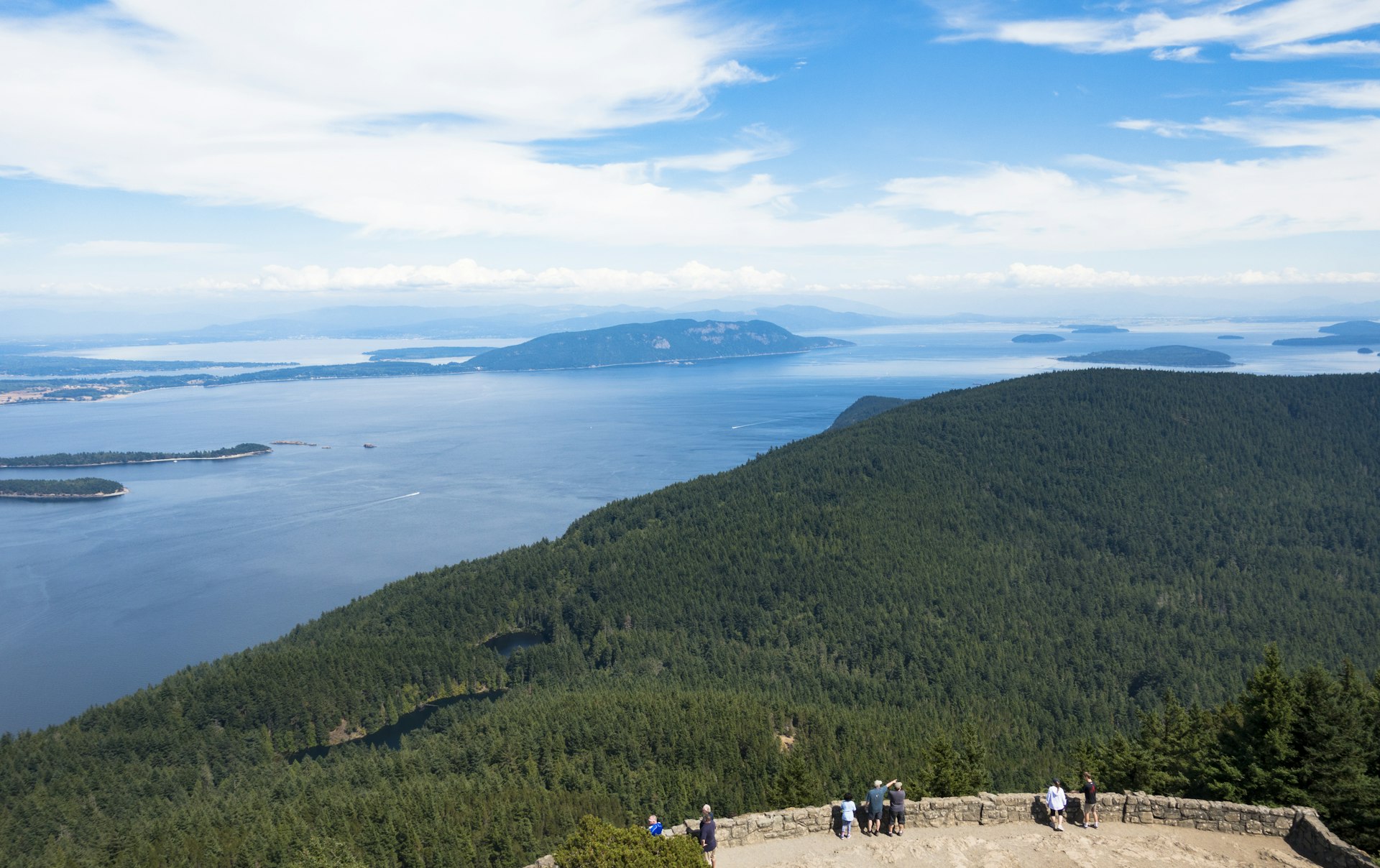 Looking out at the San Juan Islands from Mt. Constitution in Moran State Park, Washington © SEASTOCK / Shutterstock
Looking out at the San Juan Islands from Mt. Constitution in Moran State Park, Washington © SEASTOCK / Shutterstock
Washington – Moran State Park
In 1911 Robert Moran donated seven square miles of his property to create this park on the eastern saddlebag of Orcas Island. The park is dominated by 2409ft Mt Constitution, the archipelago’s highest point. On a clear day you can see Mt Rainier, Mt Baker, Vancouver’s north shore and a patchwork of tree-carpeted islands floating like emerald jewels on a blue crystalline ocean. To see above the lofty firs, a 53ft observation tower was erected in 1936 by the Civilian Conservation Corp.
5 state parks that rival national park
 Coopers Rock State Forest is a photogenic wonderland © Getty Images / iStockphoto
Coopers Rock State Forest is a photogenic wonderland © Getty Images / iStockphoto
West Virginia – Coopers Rock State Forest
The overlook at Coopers Rock near Morgantown is one of the most photogenic spots in West Virginia. Here a stone-and-log fence clings to a sandstone cliff top soaring high above the Cheat River Gorge. The leafy drive to the viewpoint is ablaze with color in fall. The Rock City Trail (0.7 mile one-way) barrels through a wonderland of boulders.
Wisconsin – Natural Bridge State Park
Balance the tourist-induced mayhem of the Wisconsin Dells with the tranquility of nearby Natural Bridge State Park in North Freedom. The “bridge” is made of sandstone and is a remnant of the last Ice Age. Nearby there’s a rock shelter used by Native people over 10,000 years ago, making it the oldest documented site of human occupation in the Upper Midwest. It’s an inspiring place for a day out.
Wyoming – Sinks Canyon State Park
Beautiful Sinks Canyon State Park, six miles southwest of Lander on Hwy 131, centers on a curious feature of the Middle Fork of the Popo Agie River, where the rushing water suddenly turns into a small cave and disappears into the soluble Madison limestone. Although the water bubbles up a quarter-mile downstream, scientists have learned it takes nearly two hours for it to make the subterranean journey before emerging warmer and with more volume.
From Acadia to Zion: A complete guide to all 63 national parks in the United States

